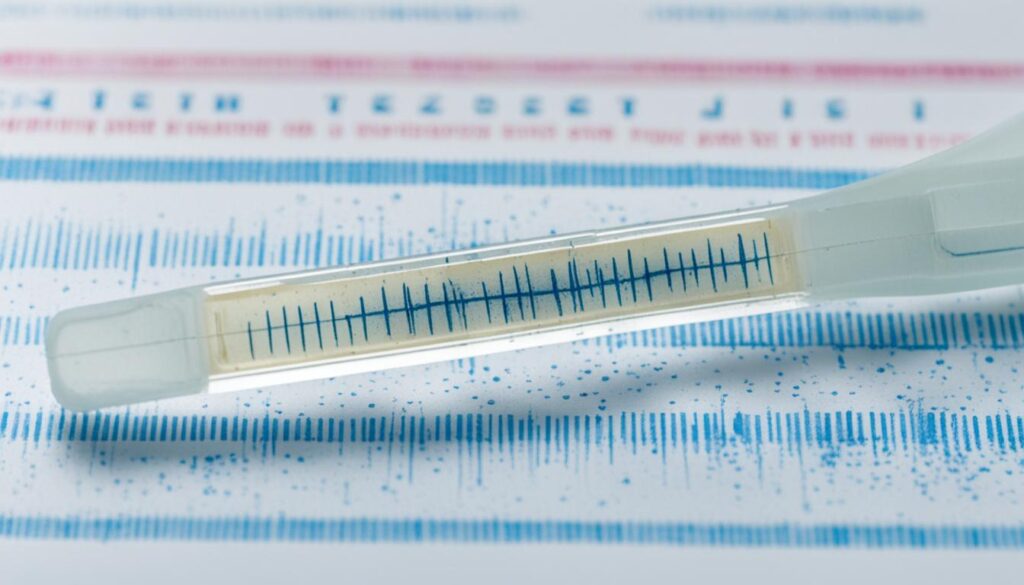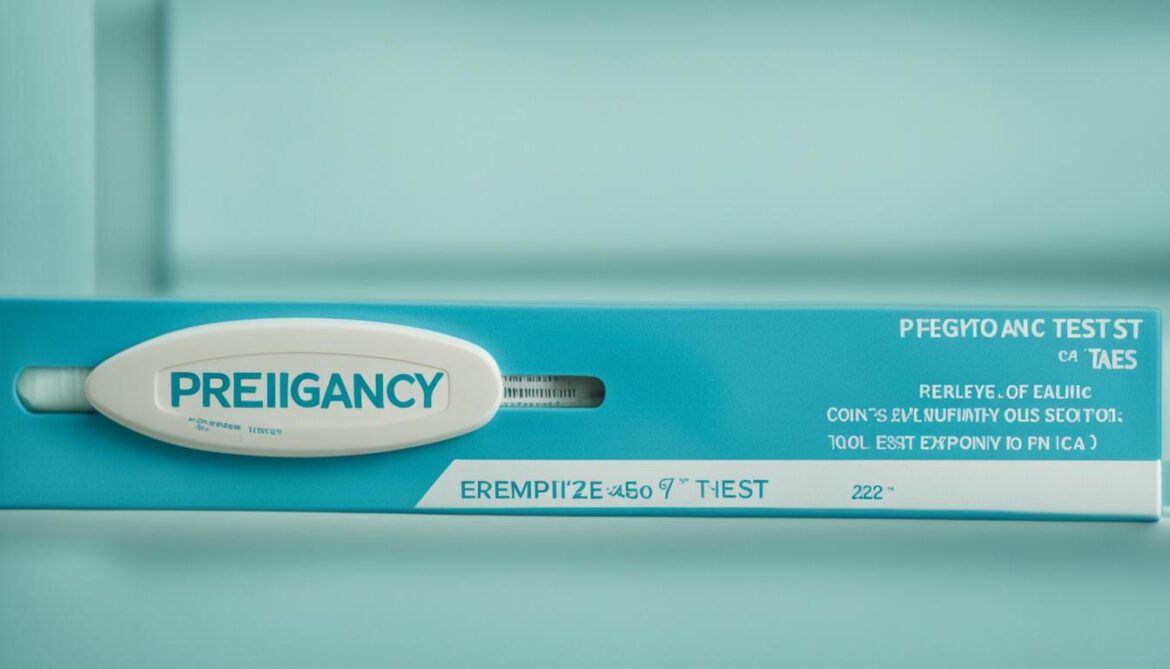Home pregnancy tests have become a reliable and convenient way for women to determine if they are pregnant. Whether you’re trying to conceive or suspecting a possible pregnancy, it’s essential to know the shelf life of these tests and whether they can expire. Understanding the expiration date on a pregnancy test can help ensure accurate results and prevent any unnecessary confusion or anxiety.
Most home pregnancy tests, including digital and early response options, come with expiration dates. These dates are usually stamped on the box and individual wrapping of each test. But why are expiration dates significant when it comes to pregnancy tests? It all comes down to the antibodies used in these tests to detect the hormone human chorionic gonadotropin (hCG).
Like any other medical diagnostic tool, the antibodies in pregnancy tests have a limited shelf life. After a certain period, they may no longer react with hCG, leading to inaccurate results. This means that if you use an expired pregnancy test, there is a higher chance of getting a false negative or false positive result.
The shelf life of a pregnancy test typically ranges from 1 to 3 years after the manufacture date. However, more sensitive tests may last longer. It’s essential to check the expiration date on the packaging before using a pregnancy test, especially if it has been stored for an extended period. Using an expired test can compromise the accuracy of the results and potentially cause unnecessary stress or confusion.
Key Takeaways:
- Home pregnancy tests, including digital and early response options, have expiration dates that are typically stamped on the packaging.
- The antibodies used in pregnancy tests to detect the hormone hCG have a shelf life and may become less effective after a certain period.
- Using an expired pregnancy test can result in false negatives or false positives, leading to inaccurate results.
- Pregnancy tests usually have a shelf life of 1 to 3 years after the manufacture date, with more sensitive tests potentially lasting longer.
- Checking the expiration date on the packaging and using a test within its shelf life is crucial for accurate results.
How Home Pregnancy Tests Work
Home pregnancy tests work by detecting the hormone hCG in a woman’s urine. hCG, or human chorionic gonadotropin, is produced by cells that form the placenta after a fertilized egg implants in the uterus. The presence of hCG in the urine is a key indicator of pregnancy.
The test itself consists of antibodies that are designed to react specifically with hCG. When urine containing hCG comes into contact with the test, it triggers a chemical reaction that produces a positive result. This reaction is typically indicated by the appearance of one or more lines on the test window. It is important to carefully follow the instructions provided with the test kit to ensure accurate interpretation of the results.
It is worth noting that hCG is also detectable in blood, which is why healthcare providers often perform blood tests to confirm pregnancy. However, urine pregnancy tests are highly reliable and convenient for home use, as they can be easily performed without the need for a laboratory or medical professional.
How to Perform a Urine Pregnancy Test
Performing a urine pregnancy test is a relatively straightforward process. Here are the general steps to follow:
- Collect a clean urine sample in a cup or container provided with the test kit.
- Remove the test device from its packaging and carefully follow the instructions regarding which part of the device to hold and where to place the urine sample.
- Wait for the recommended amount of time specified in the instructions, usually a few minutes.
- Observe the test window for the appearance of lines or other indicators, according to the instructions provided with the specific test kit.
If a positive result is obtained, it is advisable to schedule an appointment with a healthcare provider to confirm the pregnancy and discuss next steps. Negative results should be interpreted as not pregnant, but it may be necessary to repeat the test after a few days if a period does not start.
| Pregnancy Test Results | Interpretation |
|---|---|
| Two lines (one in the control window and one in the test window) | Positive for pregnancy |
| One line (only in the control window) | Negative for pregnancy |
| No lines or unclear results | Invalid test, repeat with a new test kit |
Do Pregnancy Tests Have Expiration Dates?
Yes, pregnancy tests have expiration dates. The shelf life of a pregnancy test varies depending on the brand, but it is typically 2 to 3 years from the manufacture date.
The expiration date is important because the chemicals used in the test can degrade or evaporate over time, leading to less accurate results. It is recommended to check the expiration date on the packaging before using a pregnancy test, especially if it has been stored for a long time.
Expired tests may still give results, but there is a higher chance of false negatives or false positives. To ensure accurate results, it is best to use a test that is within its shelf life.
The Importance of Checking the Expiration Date
- Expired tests may have reduced sensitivity to detect hCG hormone, leading to false negative results.
- The chemicals used in the test may degrade over time, leading to inaccurate readings.
- Using an expired test may increase the likelihood of getting false positive results.
Checking the expiration date on the packaging is a simple but crucial step to ensure the reliability of the pregnancy test.
| Brand | Shelf Life |
|---|---|
| Brand A | 2 years |
| Brand B | 3 years |
| Brand C | 2 years |
What Happens When Pregnancy Tests Expire?
When pregnancy tests expire, their effectiveness at detecting the hCG hormone decreases. The chemicals used in the test can degrade or evaporate over time, leading to inaccurate results. This means that relying on an expired pregnancy test may result in false negatives or false positives, compromising the validity of the test.
Factors such as storage conditions, including exposure to heat, cold, and humidity, can further affect the integrity of the test and contribute to its decreased accuracy. Therefore, it is essential to consider the expiration date and storage conditions before using a pregnancy test to ensure reliable results.
To visualize the effects of expired pregnancy tests, take a look at the following comparison table:
| Expired Pregnancy Test | Fresh Pregnancy Test |
|---|---|
| Inaccurate results, with a higher chance of false negatives or false positives. | Accurate results, minimizing the risk of false readings. |
| Decreased sensitivity to hCG hormone, potentially leading to missed early pregnancies. | High sensitivity to hCG hormone, increasing the chances of detecting pregnancy at an early stage. |
| Higher likelihood of experiencing uncertainty or confusion due to unreliable results. | Enhanced confidence in the test’s accuracy, providing reliable information about pregnancy status. |

As demonstrated by the comparison table and illustrated in the image above, using an expired pregnancy test can significantly impact the accuracy and reliability of the results. It is crucial to prioritize the purchase of fresh, unexpired tests to ensure the highest level of accuracy when determining pregnancy status.
Factors Affecting Pregnancy Test Accuracy
When taking a home pregnancy test, it is important to consider various factors that can affect the accuracy of the results. Understanding these factors can help you interpret the test results correctly and avoid false positives or false negatives.
False Positive Pregnancy Tests
A false positive result occurs when a pregnancy test indicates a positive result when there is no pregnancy. Several factors can contribute to false positive pregnancy tests:
- Using an expired test: Expired pregnancy tests may not provide accurate results, as the chemicals used in the test can degrade over time.
- Contaminated urine collection cups: If the urine collection cup is not clean, it can introduce substances that mimic the hormone detected by the test.
- Faulty test kits: Occasionally, defects in the test kit can produce false positive results. It is essential to follow the instructions carefully and ensure the kit is functioning properly.
- Certain medical conditions: Certain medical conditions, such as ovarian cysts or certain medications that contain hCG, can lead to false positive results.
False Negative Pregnancy Tests
A false negative result occurs when a pregnancy test indicates a negative result when there is a pregnancy. Several factors can contribute to false negative pregnancy tests:
- Taking the test too early: If the test is taken before the levels of hCG have reached a detectable level, it can result in a false negative result. It is best to wait until after a missed period to increase the accuracy of the test.
- Diluted urine: If the urine used for the test is highly diluted, it may not contain enough hCG to be detected by the test. Using concentrated urine, such as the first-morning urine, can help improve the accuracy of the test.
- Medications interfering with hCG detection: Certain medications, such as diuretics or antihistamines, can interfere with the detection of hCG and lead to false negative results.
It is important to carefully follow the instructions provided with the pregnancy test and consider these factors that may affect the accuracy of the results. Consulting a healthcare provider can provide further guidance and ensure accurate pregnancy confirmation.
How to Ensure Accurate Pregnancy Test Results
Getting accurate pregnancy test results is crucial for women who are trying to determine if they are pregnant. By following a few simple steps, you can maximize the accuracy of your home pregnancy test.
1. Check the Expiration Date
Before using a pregnancy test, always check the expiration date on the packaging. Using an expired test can lead to inaccurate results. The chemicals in the test degrade over time, reducing the test’s ability to detect the pregnancy hormone hCG.
2. Use a Test Within its Shelf Life
Using a test that is within its shelf life is essential for accurate results. Most pregnancy tests have a shelf life of 2 to 3 years from the manufacture date. Using a test that is still within this timeframe ensures that the chemicals are fresh and can detect hCG effectively.
3. Wait Until After a Missed Period
Although some home pregnancy tests claim to provide results before a missed period, waiting until after a missed period increases the accuracy of the test. This gives your body enough time to produce sufficient levels of hCG for the test to detect.
4. Use the First Morning Urine
The first-morning urine typically has the highest concentration of hCG, making it the best time to take a pregnancy test. By using the first-morning urine, you increase your chances of getting accurate results. If testing later in the day, make sure to avoid excessive fluid intake beforehand to avoid diluting the urine.
5. Discard Test Strips within Recommended Time Limit
After you’ve taken a pregnancy test, it’s important to discard the test strip within the recommended time limit. Lingering moisture or evaporation lines can lead to false results. Always follow the instructions provided with your specific test kit for the proper disposal procedure.
6. Store Unused Tests Properly
Unused pregnancy tests should be stored in a cool, dry place to maintain their accuracy. Avoid exposing them to excessive heat, humidity, or moisture, as these factors can compromise the integrity of the test.
If you have any doubts or concerns about your test results, it is always best to consult with a healthcare provider. They can provide confirmation through a blood test, which is the most accurate method of determining pregnancy.
When to Seek Professional Confirmation
Although home pregnancy tests can be effective, it is always recommended to consult a healthcare provider for pregnancy confirmation. They can conduct a blood test, which is the most accurate way to test for pregnancy and initiate prenatal screening.
A blood test can provide definitive confirmation and help address any doubts or concerns about the accuracy of a home pregnancy test.
Professional confirmation is essential for a reliable assessment of pregnancy status and to ensure appropriate medical care.
The Benefits of Consulting a Healthcare Provider for Pregnancy Confirmation
- Accurate results: Blood tests are highly accurate in detecting pregnancy and can provide precise information about hCG levels.
- Expert guidance: Healthcare providers can offer expert advice, answer questions, and provide support throughout the pregnancy journey.
- Prenatal care: Seeking professional confirmation allows healthcare providers to initiate early prenatal care, ensuring the mother and baby receive the necessary medical attention.
- Risk assessment: Healthcare providers can assess any potential risks or complications associated with the pregnancy and provide appropriate recommendations.
- Confirmation of test results: Consulting a healthcare provider can help verify the results of a home pregnancy test and address any doubts or concerns.
It is important to prioritize professional consultation to ensure the accuracy of the pregnancy test results and to receive appropriate medical guidance.
| Benefits of Professional Confirmation | Home Pregnancy Test |
|---|---|
| Accurate results | Varies based on test quality and expiration |
| Expert guidance | Depends on personal research and online resources |
| Prenatal care initiation | Delay in accessing prenatal care |
| Risk assessment | Unable to assess potential risks or complications |
| Confirmation of results | Verification of test accuracy |
Professional confirmation through a blood test offers numerous benefits over relying solely on home pregnancy tests.
Consulting a healthcare provider ensures accurate results, expert guidance, early prenatal care initiation, risk assessment, and confirmation of test accuracy.
Conclusion
It is crucial to be aware of the expiration dates on home pregnancy tests as using an expired test can lead to inaccurate results. The effectiveness of these tests relies on the integrity of the antibodies that detect the pregnancy hormone hCG. Over time, the chemicals in the test may degrade or evaporate, compromising its accuracy. Therefore, it is essential to check the expiration date on the packaging before using a pregnancy test and ensure it is within its shelf life.
To obtain the most accurate results, it is important to follow the instructions provided with the test. Waiting until after a missed period can also increase the reliability of the results. Additionally, using the first-morning urine, which typically has a higher concentration of hCG, can improve the chances of obtaining an accurate result.
If there are doubts or concerns about the accuracy of a home pregnancy test, it is recommended to seek confirmation from a healthcare provider through a blood test. A blood test is the most reliable method for determining pregnancy and can provide definitive results.
FAQ
Do pregnancy tests expire?
Yes, home pregnancy tests have expiration dates. The antibodies used in the tests to detect the hormone hCG have a shelf life, typically ranging from 1 to 3 years after manufacture.
How do home pregnancy tests work?
Home pregnancy tests detect the hormone hCG in a woman’s urine. These tests contain antibodies that react with hCG, triggering a chemical reaction that produces a positive result.
Do pregnancy tests have expiration dates?
Yes, pregnancy tests have expiration dates, typically 2 to 3 years from the manufacture date. Checking the expiration date before use is important for accurate results.
What happens when pregnancy tests expire?
When pregnancy tests expire, the effectiveness of detecting hCG hormone decreases. The chemicals used in the test can degrade or evaporate over time, leading to less accurate results.
What factors affect pregnancy test accuracy?
Factors such as using an expired test, contaminated urine collection cups, faulty test kits, taking the test too early, diluted urine, or certain medications can affect the accuracy of pregnancy tests.
How can I ensure accurate pregnancy test results?
To ensure accurate pregnancy test results, check the expiration date on the test packaging, use a test within its shelf life, and follow the instructions carefully. Taking the test after a missed period and using the first-morning urine can also increase accuracy.
When should I seek professional confirmation?
It is recommended to consult a healthcare provider for confirmation through a blood test for the most accurate pregnancy assessment.
What is the conclusion on pregnancy test expiration?
Using an expired pregnancy test can result in inaccurate results. It is best to check the expiration date and use a test within its shelf life for reliable and accurate results.







